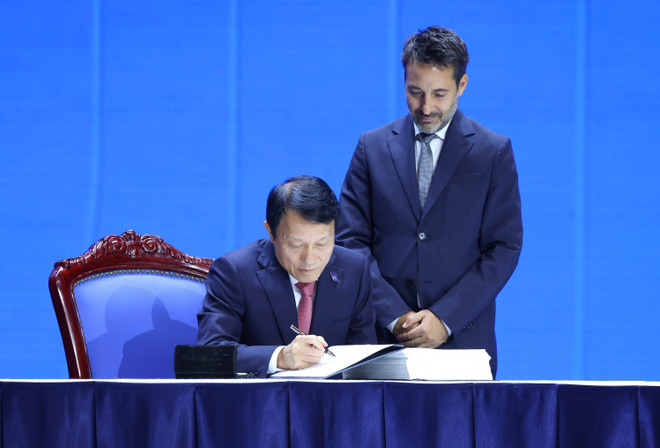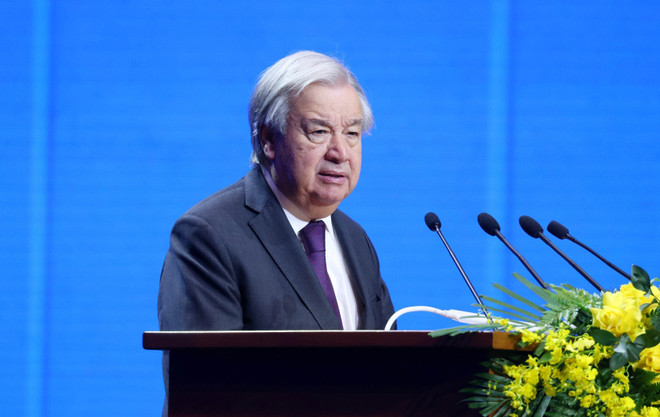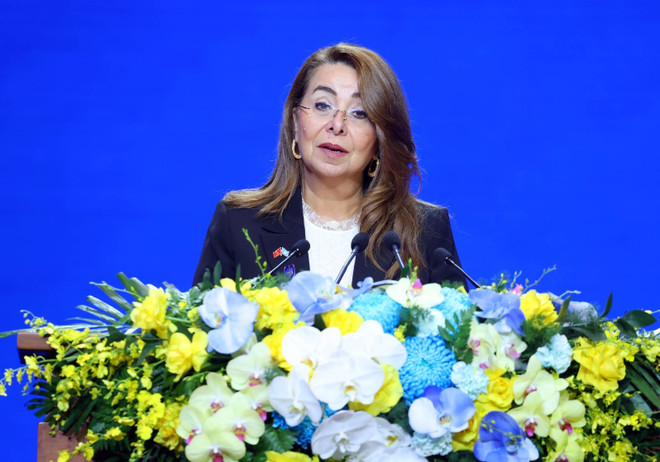President Cuong hailed the signing as a historic milestone that ushers in a new era of global cooperation in cyberspace, stating the convention not only establishes a new global legal framework but also embodies the enduring vitality of multilateralism, where nations transcend differences to shoulder shared responsibility for peace, security, stability, and development.
Vietnamese State President Luong Cuong speaks at the Hanoi Convention Signing Ceremony and High-Level Conference on October 25. (Photo: VNA)
Amidst mounting challenges from cybercrime, the UN Convention against Cybercrime (Hanoi Convention) stands as a living testament to the spirit of solidarity and the rule of law, reflecting the consensus, vitality of multilateralism, and the central role of the UN, Vietnamese State President Luong Cuong said on October 25.
The President made the remarks while presiding over the Hanoi Convention Signing Ceremony and High-Level Conference in Hanoi on October 25, which drew the participation of UN Secretary-General Antonio Guterres and high-ranking representatives from 110 countries and international organisations.
He hailed the signing as a historic milestone that ushers in a new era of global cooperation in cyberspace, stating the convention not only establishes a new global legal framework but also embodies the enduring vitality of multilateralism, where nations transcend differences to shoulder shared responsibility for peace, security, stability, and development. Themed “Countering Cybercrime – Sharing Responsibility – Securing our Future”, the event demonstrates international solidarity and the joint commitment to building a safe, healthy, and sustainable cyberspace, he underscored.
Humanity has entered cyberspace, where every line of data, every technological operation, and every digital interaction can have far-reaching impacts on the security, economy, development, and future of nations, President Cuong highlighted. He characterised cyberspace as a new space for development and a new arena for global security, where opportunities and challenges intertwine, and where technological progress must go alongside ethics and responsibility.
 Miniser of Public Security Luong Tam Quang signs the Hanoi Convention. (Photo: VNA)
Miniser of Public Security Luong Tam Quang signs the Hanoi Convention. (Photo: VNA)According to the Vietnamese State leader, amidst the remarkable advancement of the digital technology, cybercrime has expanded rapidly in scale, sophistication, and consequences, posing a direct challenge to national security and development, and the well-being of citizens. Against the backdrop, safeguarding sovereignty, national interests, and cybersecurity is not only a demand of the times but also a prerequisite for rapid and sustainable growth of each country, contributing to consolidating peace, stability and shared prosperity, he stressed.
The Hanoi Convention delivers three clear, profound and lasting messages to the world, which are reaffirming the commitment to shape an international order ensuring safety and security in cyberspace based on international law; promoting sharing, partnership, and mutual support; and highlighting that all efforts must ultimately serve the people so that technology enhances lives, development creates opportunities for all, and no one is left behind in the process of digital transformation.
He affirmed that they mirror Vietnam’s consistent approach to international integration, which is anchored in law, driven by cooperation, and centred on the people.
The country’s hosting of the signing ceremony and its role as the first signatory demonstrate Vietnam’s strong commitment to the rule of law, fulfillment of international obligations, and contributions to consolidating the global legal order in cyberspace, he said, highlighting its foreign policy of independence, self-reliance, peace, cooperation and development, multilateralisation, and diversification of external relations, and being a proactive member and a reliable, responsible partner of the international community. He called on member states to adopt the convention soon, enabling it to take effect and establish a just, inclusive, and rules-based digital order.
 UN Secretary-General António Guterres speaks at the Signing Ceremony. (Photo: VNA)
UN Secretary-General António Guterres speaks at the Signing Ceremony. (Photo: VNA)Expressing his honour to attend this historic event, UN Secretary-General António Guterres extended his gratitude to Vietnam for its pioneering role, spirit of connection, and world-class organisational capacity and hailed Hanoi as a city that embodies the spirit of the digital age - innovation, possibility and connection.
The Secretary-General noted that humanity is living in a time of extraordinary technological change. "The digital age has shrunk the distances between us while expanding the opportunities before us," he said.
He described the Hanoi Convention as the first global criminal justice treaty after more than two decades, establishing a common legal framework for nations to cooperate in combating cybercrime.
Guterres called on countries to ratify and implement the convention swiftly, turning commitments into concrete actions to ensure global cybersecurity. He affirmed that the UN will continue to accompany member states through the United Nations Office on Drugs and Crime (UNODC) and the United Nations Office for Legal Affairs (OLA) in supporting capacity-building and accelerating cooperation programmes among countries.
The UN chief stressed that by signing the convention, countries are laying the foundation for a cyberspace that is safe, respectful of human rights, and conducive to peace, security, and prosperity for all.
 UNODC Executive Director Ghada Waly speaks at the event. (Photo: VNA)
UNODC Executive Director Ghada Waly speaks at the event. (Photo: VNA)For her part, UNODC Executive Director Ghada Waly hailed the adoption and signing of the convention as a landmark achievement following five years of challenging negotiations. She expressed her appreciation to Vietnam for hosting the event and demonstrating leadership in uniting the international community in the fight against global cybercrime.
Waly said a new era of cybercrime has emerged, driven by the rapid development of artificial intelligence (AI), cryptocurrencies, and digital technologies, making threats increasingly sophisticated and transnational. She underlined that the Hanoi Convention provides a universal framework that harmonises standards, facilitates the exchange and use of electronic evidence, promotes judicial cooperation, and safeguards human rights.
The official urged countries to sign, ratify, and implement the convention without delay, requiring strong investment of political and financial resources, particularly to build capacities in developing countries.
She reaffirmed that the UNODC will continue to accompany and provide tailored technical assistance to help countries implement the convention effectively, contributing to a safer, more humane, and prosperous cyberspace.
Following the opening ceremony, State President Luong Cuong, Secretary-General António Guterres, and other delegates witnessed representatives of various countries signing the convention during the official ceremony run by the OLA.
The United Nations Convention against Cybercrime was initiated by the United Nations in 2019, stemming from the urgent need to build a comprehensive legal framework to address global challenges in non-traditional security, climate change and sustainable development. After five years of negotiations, the United Nations General Assembly officially approved the convention by consensus on December 24, 2024.
The convention, consisting of nine chapters and 71 articles, provides a comprehensive approach to preventing and combating the global scourge of cybercrime and upholding human rights principles. It addresses technical and legal challenges by adapting traditional criminal investigation methods to the information and communications technology environment, while enhancing international cooperation./.